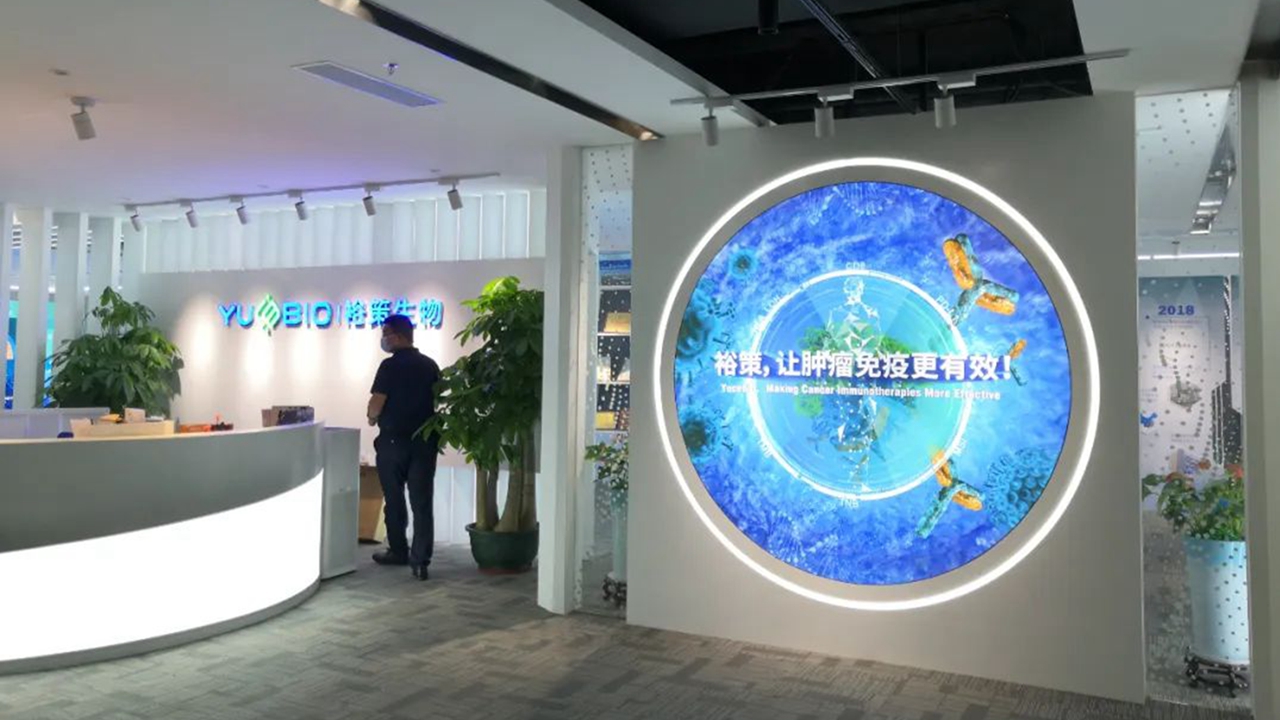Biotech companies thrive at Yantian industrial park
Cell and gene therapy is an upcoming wave of therapeutic innovation in the health care and life sciences industry, with the global cell and gene therapy market projected to reach US$25 billion by the end of 2027, according to a report published in February 2021 by BIS Research, a global markets advisory and research company.
In Yantian District, an industrial chain highlighting cell and gene therapy has already taken shape at the DBH Life Sciences & Health Industrial Park, which houses upwards of 120 biotechnology companies and over 70% of them are related to cell and gene therapy.
Shenzhen YuceBio Technology Co. Ltd., one of the first enterprises that settled in the park, is a pioneer of precision medicine and tumor immunodiagnostics and treatment in China.

The office of Shenzhen YuceBio Technology Co. Ltd. in the DBH Life Sciences & Health Industrial Park in Yantian District. Zhang Yu
“When it comes to the precise diagnosis of tumor immunotherapy, there may be no company in China that has more say than us,” Xu Ming, head of YuceBio’s management center, told reporters in a media research tour recently.
Based on its deep understanding of how the immunization mechanisms against tumors work, YuceBio has built a sound and multidimensional technology platform of cancer genomics and tumor immune microenvironment.
It is noteworthy that in the detection of tumor neoantigens and target development, the company has accumulated a large amount of data and experience. The company’s own high-frequency neoantigens database of solid tumors covers over 20 common solid tumors in China and has preliminarily completed product commercialization on specific cancers.
“We shared one patient with the West China Hospital, Sichuan University and the Shanghai 10th People’s Hospital. The patient had advanced lung adenocarcinoma, and it was previously estimated that his survival rate might only be half a year to one year. Through our search for targets, the West China Hospital, Sichuan University developed cell therapy and applied it to the patient, which prolonged his survival for about two years,” said Yang Jin, senior director of strategic operations at YuceBio.
In early 2018, GeneWell Biotechnology Co. Ltd. was founded by two doctorate degree holders who graduated from the School of Biological Sciences of the University of Cambridge. The company is dedicated to providing customers with molecular diagnostic reference standards. In just a few years, the company has rapidly developed from an entrepreneurial team of only a few people to nearly 100 employees and has grown into a national high-tech enterprise.
According to GeneWell, as the first team to promote the concept of molecular diagnostic reference products in China, the company has successfully developed and marketed a number of genetic testing reference products through its independently developed high-tech platform and has cooperated with many clinical laboratories in EQA (external quality assessment) projects.
“As the high-throughput sequencing technology develops, molecular diagnosis is being widely used in tumor diagnosis and treatment. In the molecular diagnosis market, we are establishing the local ‘standards’ in the genetic testing industry and striving to become the ‘golden standard’ recognized at home and abroad,” said Liu Qingbo, deputy general manager of GeneWell.
Shenzhen Xirui Biotech Co. Ltd. is a technological enterprise focusing on micro physiological system (organ-on-a-chip) and microfluidic technology, three-dimensional cell culture, imaging and machine learning analysis.
According to Chen Zongzheng, general manager and founder of Xirui Biotech, the company has independently developed and produced a series of products including high-throughput cell 3D culture kit, liver organ-on-chip, lung organ-on-chip, heart organ-on-chip and pump-free dynamic culture instrument. The products have been applied in life science research, new drug R&D and clinical precision medication guidance.
“The R&D of a new drug is a high-risk process, has a long cycle and high costs. Before a drug enters clinical research, its efficacy and safety must be verified on an animal model. But a humanized chip model can significantly reduce the costs and cycle of a new drug’s R&D,” Chen explained.
Zhang Cailian, the industrial park’s general manager, said that the DBH Life Sciences & Health Industrial Park was jointly built by Yantian District Government and the Dabaihui Group.
As the first industrial park specializing in cell and gene therapy industrial chain in Shenzhen, the DBH Life Sciences & Health Industrial Park has gathered over 120 enterprises engaged in fields such as cell and gene therapy, medical devices and health care services. The number of national high-tech enterprises in the park accounts for one-fourth of the total number in Yantian, and there are seven enterprises in the park with revenues over 100 million yuan (US$14.6 million) each.
Wang Jing, deputy head of Yantian’s science and technology innovation bureau, said that in recent years, the district has carried out transforming and upgrading its industrial parks, promoted renovating idle factory buildings, and prioritized space resources to the high-end medical equipment and health care industry to ensure enterprise development.